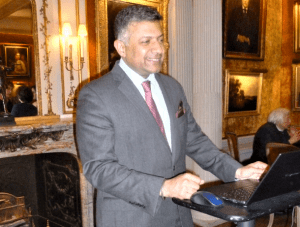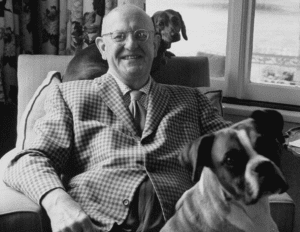PG WODEHOUSE’S step-great-grandson, Hal Cazalet, is going to India at the end of October for a month with a oneman show, Play on Words.
Wodehouse’s brand of humour has special appeal for Indians.
The show is meant to be “an evening of music, laughter, romance and glamour” to highlight Wodehouse’s career as one of the great lyricists of Broadway. In 1917 Wodehouse had six new musicals running on the New York stage.
Cazalet will be accompanied on tour by his “wonderful pianist Simon Beck”.
The show – “beautifully crafted, written and directed by Hugh Wooldridge” – will feature the work of “Wodehouse, Jerome Kern, George and Ira Gershwin, Alan Jay Lerner, Rodgers and Hammerstein, Cole Porter, Maury Yeston, Noël Coward, Stephen Sondheim, Dudley Moore, Andrew Lloyd Webber, Alan Ayckbourn and many more”.
Cazalet will begin at the National Centre for the Performing Arts in Mumbai and move on to Goa, Pune and Bengaluru. If funding allows, the hope is to extend the tour to Kolkata and New Delhi.
He has invited fans of “Plum” (the nickname for Wodehouse) to “potter along to bask in the glow of some Wodehousian sunshine”. He points out that “Wodehouse, the lyricist, is a phenomenon. As he once said, all the books that followed were simply ‘musical comedies, without the music’.”
Cazalet revealed: “Some years ago, I met the great (journalist) Anil Dharker and Quasar Thakore Padamsee in Mumbai. Anil, among many of his prolific talents, had founded the hugely popular Tata Literature Live! – the Mumbai International Litfest – some years ago. We discussed the idea of presenting Play on Words, my one-man show based on PG Wodehouse’s early career on Broadway as the ‘first great lyricist of the American musical’.
“The idea immediately fascinated me, as I was well aware of Wodehouse’s enduring popularity in India, and charmed by the fact that we all share a very similar sense of humour. Then the pandemic struck, and, tragically, Anil died during that time.

“Somehow, amid the outpouring of grief for this giant of literature, Quasar and his team gallantly kept the literature festival going online, honouring the memory of Anil in continuing to inspire and educate, and most vitally, encouraging good discussion and debate.
“I now have the good fortune to be bringing the show to various cities across India, presented by Quasar’s theatre production company, QTP.”
The Sunday Times said Cazalet’s show “wins all hearts”, while it has been described as “beguiling” by the New York Times as well as “attractively stylish” by the Guardian.
Cazalet and his sister, Lara Cazalet, did a turn last Thursday (12) when the PG Wodehouse Society (UK) held its annual dinner at the Honourable Society of Gray’s Inn in London. Present were their parents, Sir Edward Cazalet, a retired high court judge, and Camilla.

The Indian high commissioner, Vikram Doraiswami, also attended the dinner in a private capacity as a member of the PG Wodehouse Society – “I’m glad for once I don’t have to sing for my supper”.
In February, Doraiswami made a tongue-in-cheek speech at a meeting of the society in London when he suggested that Jeeves, Bertie Wooster’s “gentleman’s gentleman”, might well have been “a disguised Indian”.
“Yes, really,” the high commissioner declared. “Sift the evidence: in Right Ho, Jeeves, we hear from Bertie that Jeeves doesn’t have to open doors. He’s like one of those birds in India who bung their astral bodies about – the chaps, I mean, who having gone into thin air in Bombay, reassemble the parts and appear two minutes later in Calcutta.
“Hence, my final conclusion,” Doraiswami said. “Frankly, we love Wodehouse because, of course, his smartest and most celebrated character was a carefully disguised Indian, after whom even dry-cleaning services have been named here in London!”
He gave several reasons why Wodehouse was more popular in India than in any other country in the world, including his own.
One was sheer demographics.

“If we go by the rough rule of thumb that some 10 per cent of our population speaks fluent English – yielding a modest 130 million souls (if you can count elites as people with souls) – we deduce that the Master is better known to a larger number in India (which, frankly, isn’t difficult given the fact that there are 20 times more Indians than Britons), than even in his home country.”
Then came his clinching argument: “Indeed, as Malcolm Muggeridge said, ‘the last Englishmen left in the world are Indian’.”
He said: “You are already well aware of the peculiar phenomenon that India presents in the world of Wodehouse: it is possibly the largest continuing market for his books, with singularly devoted fans, even though the country and its outsize place in the empire is conspicuous by its absence in his books.
“Wodehouse societies apart, India is still a country where one might find Wodehouse fans in the oddest of places…. these include the not-so-gently-decaying Raj-era halls, libraries and tea-planters clubs, where one might expect to find well-thumbed copies of his books.
“The Master is also to be found in swish bookshops of Lutyens’s Delhi, the malls of Bangalore and the Raj-era streets of Calcutta. Collected sets and new prints are still sold at India’s teeming airports at bookstalls; and at railway stations and the vast jumble of second-hand booksellers that dot most old areas of our cities”.
